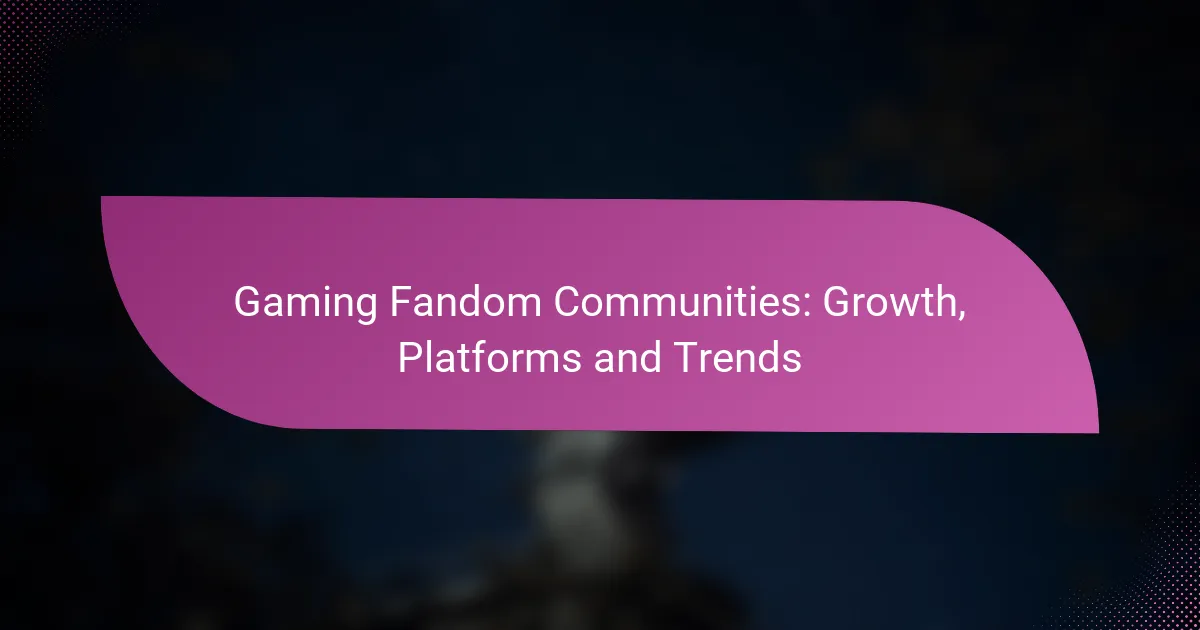Gaming fandom communities are rapidly expanding, fueled by the rise of streaming services, social media, and esports. These communities thrive on diverse platforms that enhance interaction and content sharing, while key trends such as increased diversity, virtual reality integration, and a focus on mental health awareness are shaping their evolution. As fans engage more deeply, the landscape of gaming fandom continues to transform, fostering inclusivity and collaboration among players.
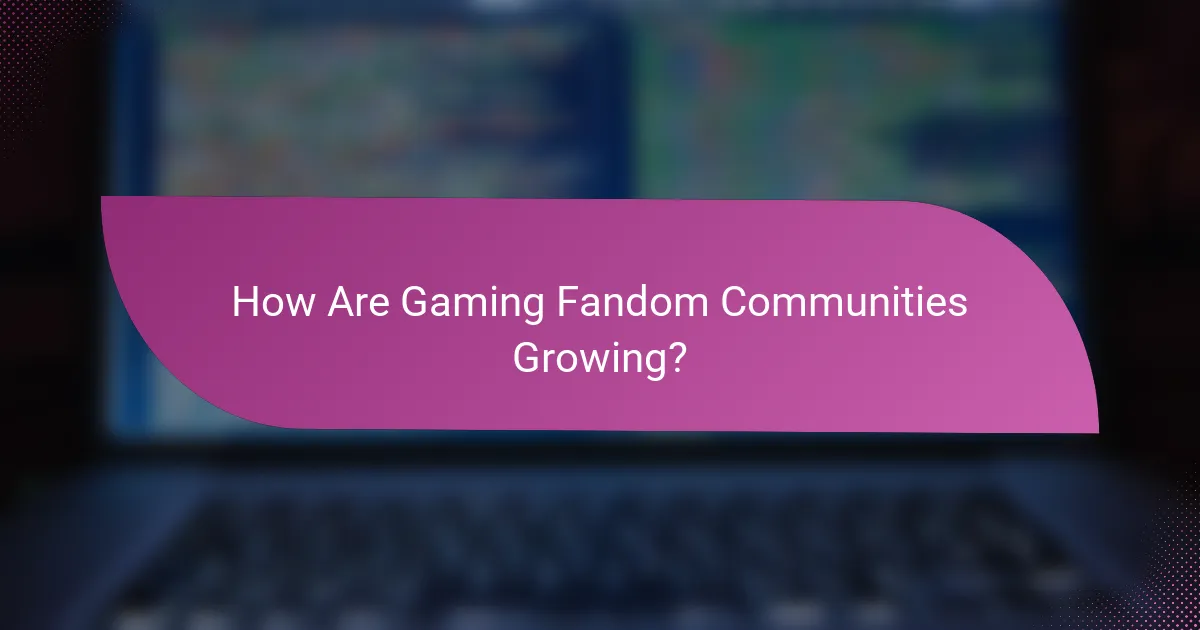
How Are Gaming Fandom Communities Growing?
Gaming fandom communities are experiencing significant growth through various online platforms and increased engagement among fans. This expansion is driven by factors such as the rise of streaming services, social media interactions, and the popularity of esports.
Increased online engagement
Online engagement in gaming fandom communities has surged as fans connect through forums, Discord servers, and gaming platforms. Players share experiences, strategies, and fan art, fostering a sense of belonging and collaboration.
To maximize engagement, communities often host events like game nights or tournaments, encouraging participation and interaction. Regular updates and discussions about game content keep members active and invested.
Rise of streaming platforms
Streaming platforms like Twitch and YouTube Gaming have transformed how fans engage with games and each other. These platforms allow gamers to broadcast their gameplay live, attracting viewers who can interact in real-time through chat.
Content creators often build dedicated communities around their channels, offering exclusive content and fostering loyalty among fans. This trend has led to a significant increase in viewer participation and community-building activities.
Expansion of social media groups
Social media platforms such as Facebook, Reddit, and Twitter have become vital spaces for gaming fandom communities. These groups facilitate discussions, share news, and organize events, making it easier for fans to connect over shared interests.
Active participation in these groups can enhance the gaming experience, as members exchange tips, organize meetups, and collaborate on fan projects. Maintaining a respectful and inclusive environment is crucial for fostering positive interactions.
Growth in esports participation
The esports industry has seen remarkable growth, with more players and fans participating in competitive gaming. This rise has led to the formation of dedicated communities that support teams and players, enhancing the overall gaming experience.
Fans often engage by attending live events, streaming matches, and participating in online discussions. Joining local or online leagues can also provide opportunities for players to compete and connect with others who share their passion.
Influence of gaming conventions
Gaming conventions like PAX and E3 play a significant role in the growth of gaming fandom communities. These events bring fans together to celebrate their favorite games, meet developers, and participate in panels and workshops.
Attending conventions can strengthen community bonds and provide unique opportunities for networking. Fans often share experiences and insights from these events online, further expanding their communities and fostering excitement around upcoming releases.
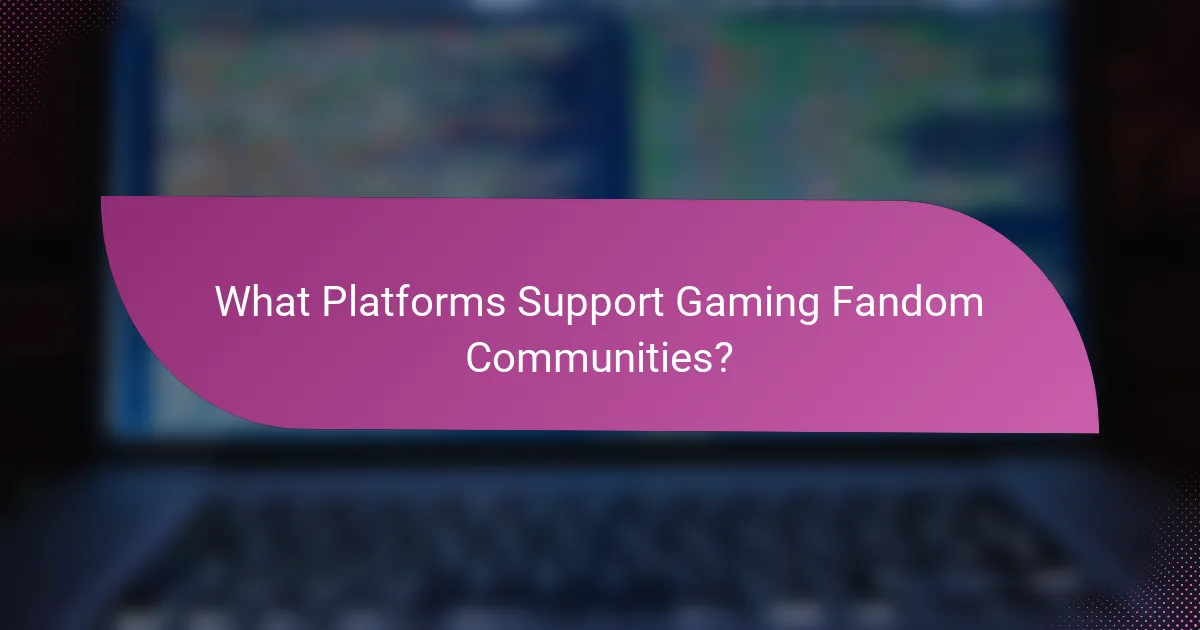
What Platforms Support Gaming Fandom Communities?
Gaming fandom communities thrive on various platforms that cater to different aspects of interaction, from live streaming to social networking. Each platform offers unique features that facilitate engagement, discussions, and content sharing among fans.
Twitch for live streaming
Twitch is a leading platform for live streaming video games, where gamers can broadcast their gameplay in real-time. Viewers can interact through chat, creating a dynamic environment that fosters community engagement.
Streamers often build dedicated fanbases, and many utilize subscription models or donations to monetize their channels. Regularly scheduled streams can help maintain viewer interest and community involvement.
Discord for community building
Discord serves as a versatile platform for community building, allowing users to create servers tailored to specific games or interests. These servers can host text and voice channels, enabling real-time communication among members.
Many gaming communities use Discord for organizing events, sharing content, and facilitating discussions. It’s essential to establish clear rules and moderation to maintain a positive environment.
Reddit for discussions
Reddit hosts numerous subreddits dedicated to gaming, where users can post questions, share experiences, and engage in discussions. This platform is ideal for in-depth conversations and community-driven content.
Participating in relevant subreddits can help fans stay informed about game updates and trends. However, it’s crucial to follow subreddit rules and engage respectfully to foster a healthy community atmosphere.
Facebook for group interactions
Facebook groups provide a space for gamers to connect and share content within a more personal network. These groups can be public or private, allowing for varying levels of privacy and interaction.
Members can post updates, share videos, and organize events, making it a useful tool for community engagement. However, the platform’s algorithm may limit visibility, so active participation is key to maintaining group activity.
Twitter for news and updates
Twitter is a fast-paced platform ideal for sharing news, updates, and quick interactions within the gaming community. Gamers and developers often use Twitter to announce game releases, updates, and events.
Following relevant accounts and using hashtags can help fans stay connected with the latest trends. However, the brevity of tweets means that discussions can be superficial, so deeper conversations may need to occur on other platforms.
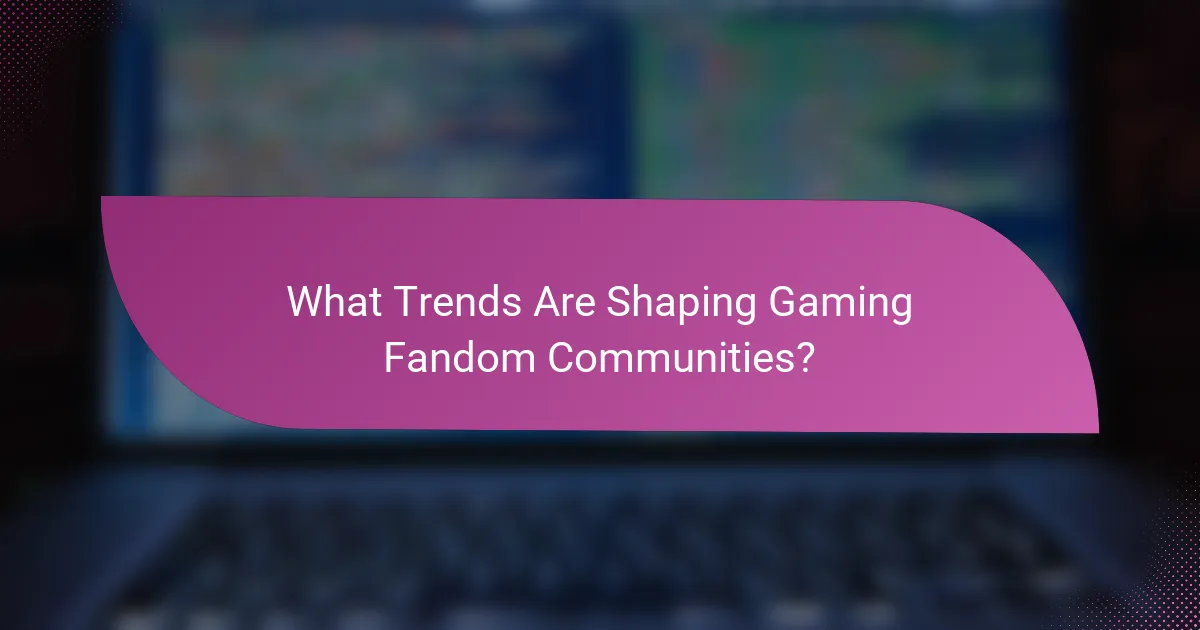
What Trends Are Shaping Gaming Fandom Communities?
Gaming fandom communities are evolving rapidly due to several key trends that enhance engagement and inclusivity. These trends include increased diversity, the integration of virtual reality, a focus on mental health awareness, the rise of indie game communities, and the popularity of cross-platform gaming.
Increased diversity in gaming
The gaming industry is witnessing a significant shift towards greater diversity, both in game development and within gaming communities. This includes a broader representation of characters, stories, and creators from various backgrounds, which helps to attract a wider audience.
As a result, gaming fandoms are becoming more inclusive, allowing players from different cultures and identities to find relatable content. This diversity fosters richer discussions and connections among community members.
Integration of virtual reality
Virtual reality (VR) is transforming how gamers interact with their favorite titles and each other. VR platforms enable immersive experiences that deepen engagement and create new forms of social interaction within fandom communities.
As VR technology becomes more accessible, communities are likely to see an increase in VR-specific events and gatherings, enhancing the sense of belonging among fans. Gamers can now participate in virtual meetups, tournaments, and collaborative gameplay in ways that were previously unimaginable.
Focus on mental health awareness
There is a growing emphasis on mental health within gaming fandoms, with many communities advocating for well-being and support. Gamers are increasingly discussing issues like anxiety, depression, and burnout, creating a more supportive environment.
Community leaders are organizing initiatives such as mental health awareness campaigns and providing resources for those in need. This focus helps to destigmatize mental health challenges and encourages open conversations among fans.
Rise of indie game communities
Indie games are gaining popularity, leading to the emergence of dedicated communities around these titles. Indie developers often engage directly with their audiences, fostering a sense of connection and collaboration.
These communities often prioritize creativity and innovation, allowing fans to support unique projects that may not fit traditional gaming molds. Players can participate in crowdfunding campaigns, beta testing, and feedback sessions, enhancing their investment in the games they love.
Popularity of cross-platform gaming
Cross-platform gaming is becoming a standard feature, allowing players on different devices to connect and play together. This trend is reshaping fandom communities by breaking down barriers between console and PC gamers.
As more games support cross-play, communities are expanding, leading to larger player bases and diverse interactions. Gamers can now collaborate and compete with friends regardless of their chosen platform, enhancing the social aspect of gaming.
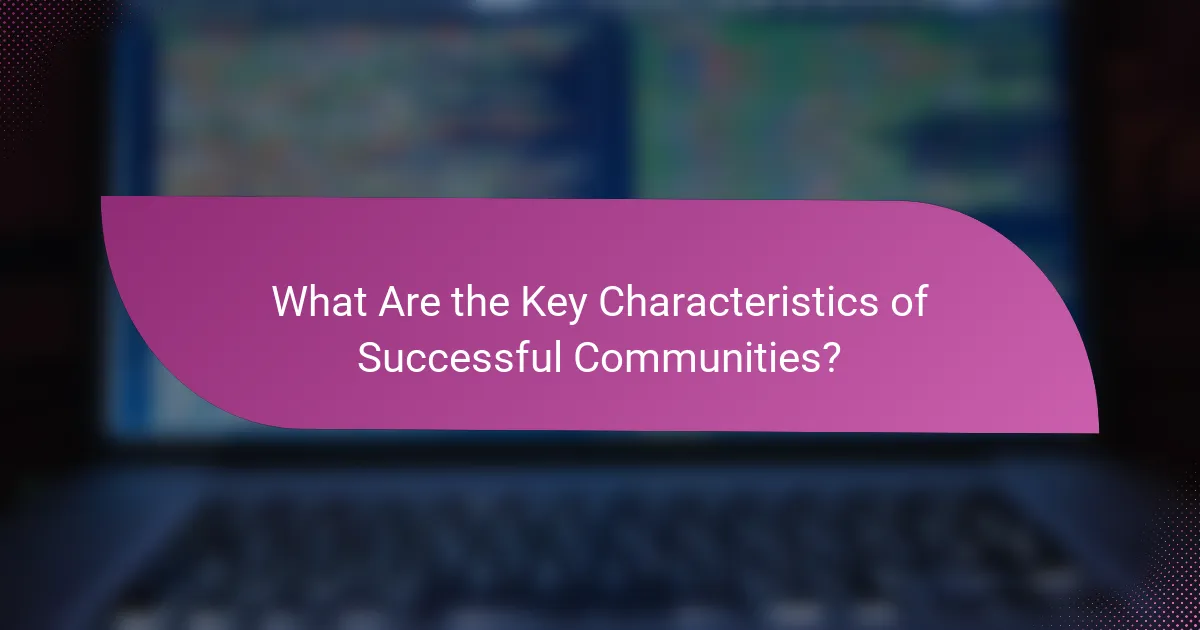
What Are the Key Characteristics of Successful Communities?
Successful gaming fandom communities are characterized by active participation, clear guidelines, and an inclusive atmosphere. These elements foster engagement and ensure that members feel valued and connected.
Active member participation
Active participation is crucial for the vitality of any gaming community. Members should regularly engage in discussions, share content, and contribute to events or activities. This can be encouraged through regular challenges, polls, or community events that motivate users to interact.
To promote participation, consider implementing a reward system for active members, such as recognition in community newsletters or exclusive access to special events. This not only boosts engagement but also creates a sense of belonging among members.
Clear community guidelines
Establishing clear community guidelines is essential for maintaining a respectful and constructive environment. These guidelines should outline acceptable behavior, content sharing policies, and conflict resolution processes. Transparency in rules helps prevent misunderstandings and ensures that all members know what is expected of them.
Regularly reviewing and updating these guidelines based on community feedback can help keep them relevant. Consider creating a simple checklist of dos and don’ts to make the rules easily digestible for new members.
Inclusive and welcoming environment
An inclusive and welcoming environment encourages diverse participation and fosters a sense of community. This can be achieved by promoting respectful dialogue and celebrating the unique backgrounds and perspectives of all members. Highlighting diverse voices through features or spotlights can enhance this inclusivity.
To ensure everyone feels welcome, consider implementing initiatives such as mentorship programs for newcomers or hosting events that cater to various interests within the gaming community. This approach not only enriches the community but also strengthens member connections.
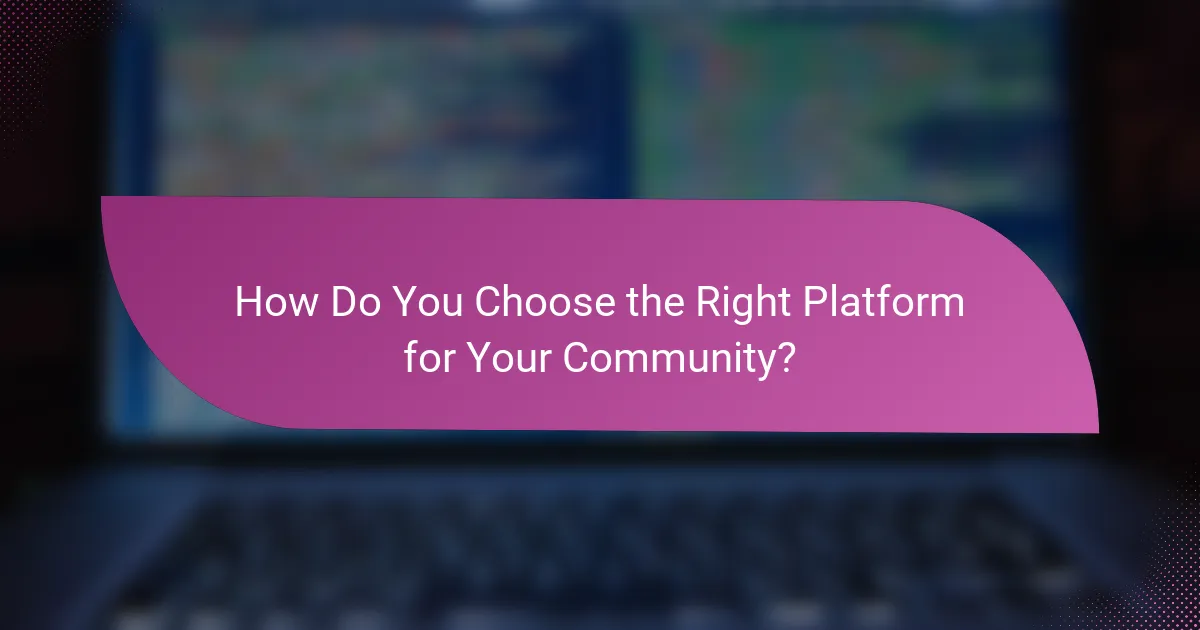
How Do You Choose the Right Platform for Your Community?
Choosing the right platform for your gaming fandom community involves assessing your audience’s preferences, the features offered by each platform, and the level of engagement you aim to achieve. Consider factors such as ease of use, accessibility, and the specific needs of your community members.
Evaluate Your Community’s Needs
Understanding your community’s needs is crucial for selecting a platform. Consider what your members value most—whether it’s forums for discussion, live streaming capabilities, or social media integration. Conduct surveys or polls to gather insights on preferred features.
For instance, if your community thrives on real-time interaction, platforms like Discord or Twitch may be more suitable. Conversely, if your focus is on in-depth discussions, traditional forums or Reddit might be better options.
Compare Popular Platforms
There are several popular platforms to consider, each with unique strengths. Discord offers voice and text chat, making it ideal for gaming communities. Reddit provides a structured forum for discussions, while platforms like Facebook and Twitter allow for broader social engagement.
- Discord: Best for real-time communication and community building.
- Reddit: Great for threaded discussions and topic-focused communities.
- Twitch: Perfect for live streaming and interactive content.
- Facebook Groups: Useful for reaching a wider audience and sharing updates.
Consider Accessibility and Usability
Accessibility and usability are key factors when choosing a platform. Ensure that the platform is user-friendly and accessible across different devices, including mobile phones and tablets. A complicated interface can deter participation.
Check if the platform supports multiple languages or has features that cater to diverse audiences. This can enhance engagement and inclusivity within your community.
Assess Moderation and Safety Features
Moderation tools and safety features are essential for maintaining a healthy community environment. Look for platforms that offer robust moderation capabilities, such as user reporting, content filtering, and admin controls.
Additionally, consider the platform’s policies on harassment and abuse. A platform that prioritizes user safety will foster a more welcoming atmosphere, encouraging participation and interaction.
